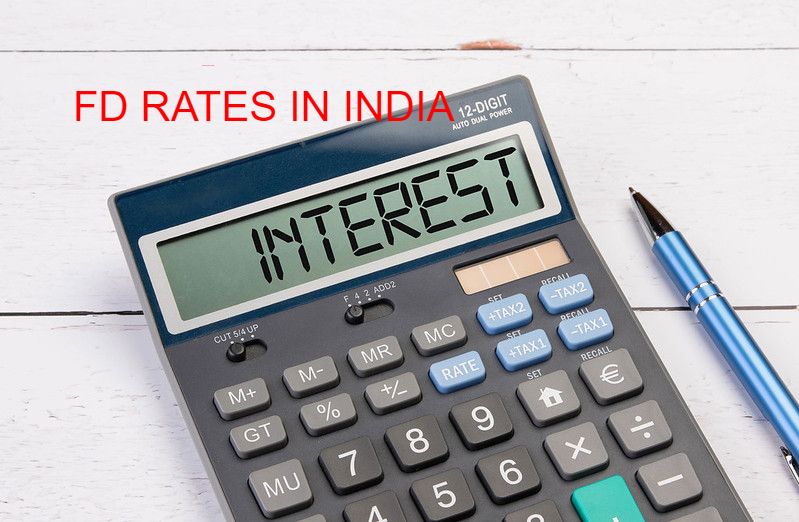Is Interest on Fixed Deposit taxable in India ?

WHO ACCEPTS FIXED DEPOSITS FROM PUBLIC IN INDIA ?
Several entities are authorized to receive fixed deposits. These primarily include:
Scheduled Commercial Banks:
This includes public sector banks, private sector banks, and foreign banks operating in India.
Small Finance Banks:
These banks are specifically licensed to provide basic banking services, including accepting fixed deposits.
Non-Banking Financial Companies (NBFCs):
Certain NBFCs, particularly those authorized to accept public deposits, can offer fixed deposit schemes. However, it’s crucial to verify that the NBFC is authorized by the Reserve Bank of India (RBI) to accept such deposits.
Cooperative Banks:
Both urban and rural cooperative banks may offer fixed deposit facilities.
Small Industries Development Bank of India (SIDBI):
SIDBI also offers fixed deposit schemes.
FIXED DEPOSIT INTEREST RATES :
RBI has given the freedom to commercial banks to fix their own interest rates on domestic term deposits of various maturities with the prior approval of their respective Board of Directors/Asset Liability Management Committee (ALCO). Banks are, however, not allowed to discriminate in the matter of interest paid on deposits, between one deposit and another, accepted on the same date and for the same maturity, whether such deposits are accepted at the same office or at different offices of the bank. Interest rates paid by the bank should be as per the schedule and should not be subject to negotiation between the depositor and the bank. Banks are allowed to offer differential rate of interest on domestic term deposits on the basis of the following: (a) Tenor of Deposits (b) Size of Deposits (c) Availability of early withdrawal option
Hence Bank customers , to get a better interest rate on deposits ,have to get information on interest rates being offered by various banks for the same tenor and place the deposit .
Is Interest on Fixed deposits Taxable ?
Yes, the interest earned on fixed deposits (FDs) in India is taxable. Here’s a breakdown of the key points:
Taxation as per Income Tax Slab:
The interest income from FDs is added to your total income and taxed according to your applicable income tax slab.
Tax Deducted at Source (TDS):
Banks and financial institutions deduct TDS on FD interest if it exceeds certain thresholds.
Here are the key TDS thresholds:
For individuals below 60 years:
TDS is deducted if the annual interest income exceeds ₹40,000.
For senior citizens (60 years and above):
TDS exemption limit has been increased to ₹1,00,000 for financial year 2025-2026.
The standard TDS rate is 10%. However, if you do not provide your Permanent Account Number (PAN), the TDS rate increases to 20%.
Forms 15G and 15H:
If your total income is below the taxable limit, you can submit Form 15G (for individuals below 60 years) or Form 15H (for senior citizens) to avoid TDS deduction.
TDS Threshold:
It’s important to differentiate between TDS (Tax Deducted at Source) and overall tax liability.
For financial year 2024-2025, the TDS threshold on interest income for senior citizens is ₹50,000.
For financial year 2025-2026, this TDS threshold is increasing to ₹1,00,000. This means that banks will only deduct TDS if the interest earned exceeds these respective limits.
Section 80TTB:
Under the old tax regime , Senior citizens can claim a deduction of up to ₹50,000 on interest income from deposits (including FDs) under Section 80TTB of the Income Tax Act.
Taxation as per Slab:
Even if TDS is not deducted, the interest income is still added to the senior citizen’s total income and taxed according to their applicable income tax slab.
Form 15H:
Senior citizens whose total income is below the taxable limit can submit Form 15H to their banks to prevent TDS deduction.
BANK FD RATES IN INDIA :
COMPARITIVE FIXED DEPOSIT INTEREST RATES
offered by Indian Banks
PLAN N PROGRESS compares interest rates of various banks .
1. We have selected periods of 1 year and 5 years for comparison of interest rates offered by Indian commercial banks including Public Sector banks , Private Sector Banks, and Foreign banks with a network of branches and also Small Finance banks, a new breed of banks in India . The below tables give information on interest rates offered by various banks.
2 . The interest rates are on retail term deposits for public and senior citizens .
3. Normally interest rates quoted are valid for less than Rs 3 crore .
4. For actual terms and conditions and the latest rates, you may visit the banks’ websites listed at the end alphabetically.
5. The rates we took are updated on or about 4th, November 2024 and are subject to change.
Which bank provides maximum interest on FD?
FOR ONE YEAR DEPOSITS
A. The public sector banks are offering interest rates between 6.10 % % to 7.10 % for public ( 6.60 % to 7.60 % to Senior Citizens ) .
B. The private sector banks are offering interest rates between 5.00 % to 7.75 % % for public and between 5.50 % to 8.25 % for senior citizens
C .The Small Finance banks are paying interest now in the range of 6.00 % to 8.25 % for public and 6.50 % to 8.75 % for the senior citizens
FOR 5 YEAR DEPOSITS A. Public sector banks pay between 6.00 % to 6.80 % ( 6.60 % to 7.50 % for senior citizens )
B. Private sector banks pay between 5.75 % to 7.25 % ( 6.25 % to 8.00 % for senior citizens ) .
C. .Small finance banks pay between 6.25 % to 8.60 % for public ( 6.75 % to 9.10 pa % for the senior citizens )
There are NBFC companies , co-operative societies and corporates who pay higher interest rates , but have higher risk weight-ages .
SPECIAL DEPOSITS FOR SENIOR CITIZENS AND GENERAL PUBLIC
Some banks have introduced special deposit schemes for senior citizens and general public for special number of days with special interest rates . Some also are offering additional interest rates for deposits of period above 5 years for the senior citizens .
NOTE : 1. Depositors get DICGC cover of Rs 5.00 lakhs on Bank Deposits as insurance .
NON-CALLABLE DEPOSIT – MINIMUM DEPOSIT AMOUNT RAISED
Dated 27.10.2023 : So far banks could take non-callable deposits from the public on a deposit amount of Rs 15 lakhs or more . Non-callable deposits fetch higher rate of interest while premature closure is not allowed .
Now , as per notification issued by Reserve Bank of India ( RBI ) . banks will not be able to receive such deposits for an amount less than Rupees one crore . The minimum amount for offering non-callable TDs is increased from Rupees fifteen lakh to Rupees one crore i.e., all domestic term deposits accepted from individuals for amount of Rupees one crore and below shall have premature-withdrawal-facility . The instruction is also applicable for Non-Resident (External) Rupee (NRE) Deposit / Ordinary Non-Resident (NRO) Deposits. .
To read RBI NOTIFICATION DATED 26.10.2023 , CLICK HERE
FOR THE LATEST FD INTEREST RATES OF PUBLIC SECTOR BANKS , CLICK HERE
FOR THE LATEST FD INTEREST RATES OF PRIVATE SECTOR BANKS , CLICK HERE
FOR THE LATEST INTEREST RATES OFFERED BY SMALL FINANCE BANKS , CLICK HERE
For NBFC DEPOSITS , CLICK HERE
DISCLAIMER
Use of the information at this site www.plannprogress.com is at one’s own risk. We do not offer to sell or solicit to buy any financial instruments including Deposits , Loans whether short term or otherwise , Mortgages , Stocks , Insurance or Mutual Funds .This site does not offer to sell or solicitation to buy any securities and we will not be liable for any losses incurred or investment(s) made or decisions taken/or not taken based on the information provided herein. Information contained herein are purely for educational purposes and does not constitute a personal recommendation or take into account the particular investment objectives, financial situations, or needs of individual investors. Before acting on any recommendation, investors should consider whether it is suitable for their particular circumstances and, if necessary, seek an independent professional advice.
Entry to this site is free of charge and we do not charge any fees what so ever . No need for registration for viewing the site . All content and information is provided on an ‘As Is’ basis by us. Information herein is believed to be reliable, but does not warrant its completeness or accuracy and expressly disclaims all warranties and conditions of any kind, whether express or implied. As a condition to accessing http://www.plannprogress.com content and website, you agree to our Terms and Conditions of Use, Privacy policy & Disclaimer available on the links . The performance data quoted represents past performance and does not guarantee future results.
Articles/ Pages in this site contain advertisements and links to various third party sites / blogs as we have found articles therein interesting and useful and we believe reliable . Those links sites and advertisements may contain offer of sales or services of various kinds including financial services . We accept no responsibility for the accuracy , correctness and/or completeness of any information contained therein as we have not independently verified. The links and third party advertisements are governed by the privacy policy of those third party sites / blogs. We do not warrant or guarantee for any services or sales utilized therein . This site expressly disclaims all warranties and conditions of any kind, whether express or implied. However readers are advised to exercise their discretion in utilising / following any advice contained therein or utilizing any services or accepting their sales or any other offers and we do not take any responsibility what so ever.
The site is governed by Indian Laws and comes within the jurisdiction of courts in Mysuru , Karnataka , India
Contact Information : The site www.plannprogress.com is owned and operated by Mr . Manjunathan B.N. , No 37, 5thBlock , Madhuvana Layout , Sriramapura 2nd stage , Mysuru 570023 , Karnataka , India and can be contacted at email : info@plannprogress.com
This website uses cookies to provide necessary site functionality and to improve your experience. By using this website, you agree to our use of cookies.
